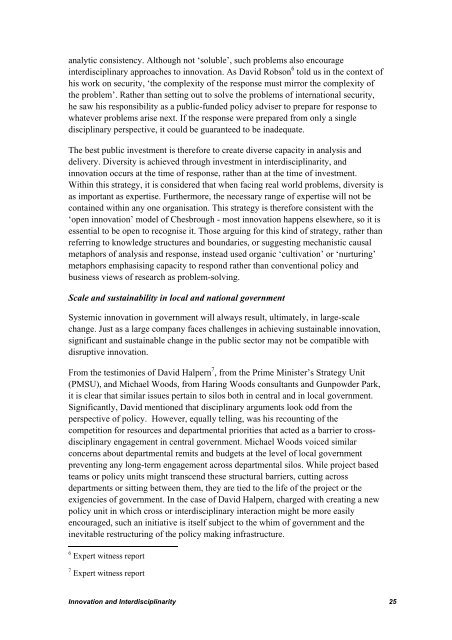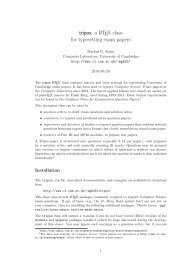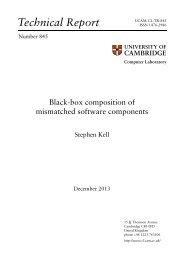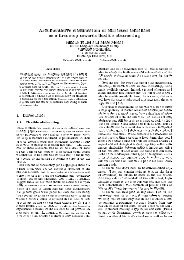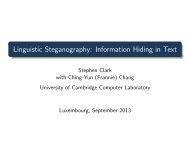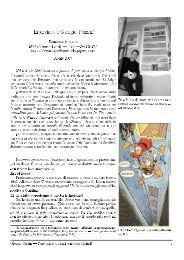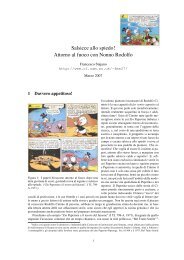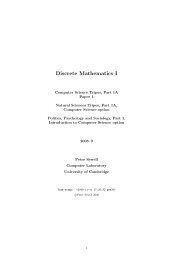Radical innovation: crossing knowledge boundaries with ...
Radical innovation: crossing knowledge boundaries with ...
Radical innovation: crossing knowledge boundaries with ...
You also want an ePaper? Increase the reach of your titles
YUMPU automatically turns print PDFs into web optimized ePapers that Google loves.
analytic consistency. Although not ‘soluble’, such problems also encourage<br />
interdisciplinary approaches to <strong>innovation</strong>. As David Robson 6 told us in the context of<br />
his work on security, ‘the complexity of the response must mirror the complexity of<br />
the problem’. Rather than setting out to solve the problems of international security,<br />
he saw his responsibility as a public-funded policy adviser to prepare for response to<br />
whatever problems arise next. If the response were prepared from only a single<br />
disciplinary perspective, it could be guaranteed to be inadequate.<br />
The best public investment is therefore to create diverse capacity in analysis and<br />
delivery. Diversity is achieved through investment in interdisciplinarity, and<br />
<strong>innovation</strong> occurs at the time of response, rather than at the time of investment.<br />
Within this strategy, it is considered that when facing real world problems, diversity is<br />
as important as expertise. Furthermore, the necessary range of expertise will not be<br />
contained <strong>with</strong>in any one organisation. This strategy is therefore consistent <strong>with</strong> the<br />
‘open <strong>innovation</strong>’ model of Chesbrough - most <strong>innovation</strong> happens elsewhere, so it is<br />
essential to be open to recognise it. Those arguing for this kind of strategy, rather than<br />
referring to <strong>knowledge</strong> structures and <strong>boundaries</strong>, or suggesting mechanistic causal<br />
metaphors of analysis and response, instead used organic ‘cultivation’ or ‘nurturing’<br />
metaphors emphasising capacity to respond rather than conventional policy and<br />
business views of research as problem-solving.<br />
Scale and sustainability in local and national government<br />
Systemic <strong>innovation</strong> in government will always result, ultimately, in large-scale<br />
change. Just as a large company faces challenges in achieving sustainable <strong>innovation</strong>,<br />
significant and sustainable change in the public sector may not be compatible <strong>with</strong><br />
disruptive <strong>innovation</strong>.<br />
From the testimonies of David Halpern 7 , from the Prime Minister’s Strategy Unit<br />
(PMSU), and Michael Woods, from Haring Woods consultants and Gunpowder Park,<br />
it is clear that similar issues pertain to silos both in central and in local government.<br />
Significantly, David mentioned that disciplinary arguments look odd from the<br />
perspective of policy. However, equally telling, was his recounting of the<br />
competition for resources and departmental priorities that acted as a barrier to crossdisciplinary<br />
engagement in central government. Michael Woods voiced similar<br />
concerns about departmental remits and budgets at the level of local government<br />
preventing any long-term engagement across departmental silos. While project based<br />
teams or policy units might transcend these structural barriers, cutting across<br />
departments or sitting between them, they are tied to the life of the project or the<br />
exigencies of government. In the case of David Halpern, charged <strong>with</strong> creating a new<br />
policy unit in which cross or interdisciplinary interaction might be more easily<br />
encouraged, such an initiative is itself subject to the whim of government and the<br />
inevitable restructuring of the policy making infrastructure.<br />
6 Expert witness report<br />
7 Expert witness report<br />
Innovation and Interdisciplinarity 25


